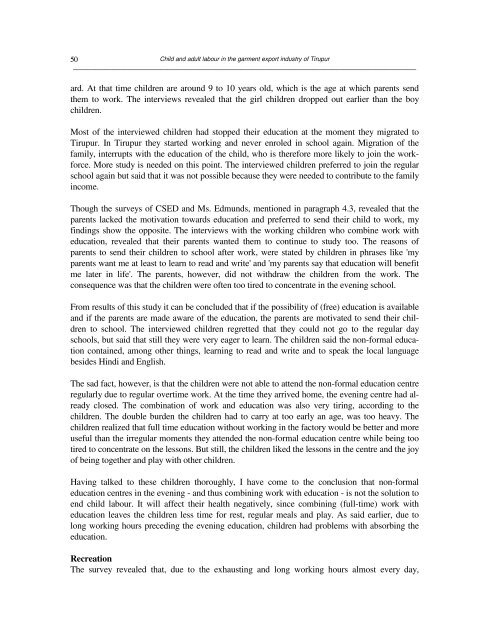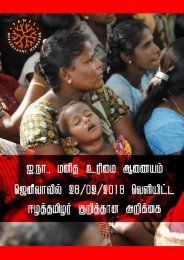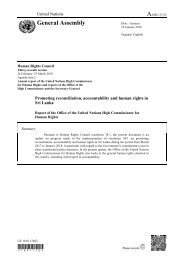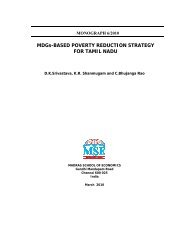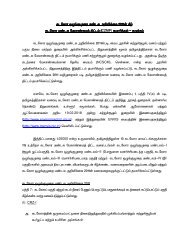You also want an ePaper? Increase the reach of your titles
YUMPU automatically turns print PDFs into web optimized ePapers that Google loves.
50<br />
<strong>Child</strong> <strong>and</strong> <strong>adult</strong> <strong>labour</strong> <strong>in</strong> <strong>the</strong> <strong>garment</strong> <strong>export</strong> <strong>in</strong>dustry <strong>of</strong> Tirupur<br />
──────────────────────────────────────────────────────────────────────────────────────────────<br />
ard. At that time children are around 9 to 10 years old, which is <strong>the</strong> age at which parents send<br />
<strong>the</strong>m to work. The <strong>in</strong>terviews revealed that <strong>the</strong> girl children dropped out earlier than <strong>the</strong> boy<br />
children.<br />
Most <strong>of</strong> <strong>the</strong> <strong>in</strong>terviewed children had stopped <strong>the</strong>ir education at <strong>the</strong> moment <strong>the</strong>y migrated to<br />
Tirupur. In Tirupur <strong>the</strong>y started work<strong>in</strong>g <strong>and</strong> never enroled <strong>in</strong> school aga<strong>in</strong>. Migration <strong>of</strong> <strong>the</strong><br />
family, <strong>in</strong>terrupts with <strong>the</strong> education <strong>of</strong> <strong>the</strong> child, who is <strong>the</strong>refore more likely to jo<strong>in</strong> <strong>the</strong> workforce.<br />
More study is needed on this po<strong>in</strong>t. The <strong>in</strong>terviewed children preferred to jo<strong>in</strong> <strong>the</strong> regular<br />
school aga<strong>in</strong> but said that it was not possible because <strong>the</strong>y were needed to contribute to <strong>the</strong> family<br />
<strong>in</strong>come.<br />
Though <strong>the</strong> surveys <strong>of</strong> CSED <strong>and</strong> Ms. Edmunds, mentioned <strong>in</strong> paragraph 4.3, revealed that <strong>the</strong><br />
parents lacked <strong>the</strong> motivation towards education <strong>and</strong> preferred to send <strong>the</strong>ir child to work, my<br />
f<strong>in</strong>d<strong>in</strong>gs show <strong>the</strong> opposite. The <strong>in</strong>terviews with <strong>the</strong> work<strong>in</strong>g children who comb<strong>in</strong>e work with<br />
education, revealed that <strong>the</strong>ir parents wanted <strong>the</strong>m to cont<strong>in</strong>ue to study too. The reasons <strong>of</strong><br />
parents to send <strong>the</strong>ir children to school after work, were stated by children <strong>in</strong> phrases like 'my<br />
parents want me at least to learn to read <strong>and</strong> write' <strong>and</strong> 'my parents say that education will benefit<br />
me later <strong>in</strong> life'. The parents, however, did not withdraw <strong>the</strong> children from <strong>the</strong> work. The<br />
consequence was that <strong>the</strong> children were <strong>of</strong>ten too tired to concentrate <strong>in</strong> <strong>the</strong> even<strong>in</strong>g school.<br />
From results <strong>of</strong> this study it can be concluded that if <strong>the</strong> possibility <strong>of</strong> (free) education is available<br />
<strong>and</strong> if <strong>the</strong> parents are made aware <strong>of</strong> <strong>the</strong> education, <strong>the</strong> parents are motivated to send <strong>the</strong>ir children<br />
to school. The <strong>in</strong>terviewed children regretted that <strong>the</strong>y could not go to <strong>the</strong> regular day<br />
schools, but said that still <strong>the</strong>y were very eager to learn. The children said <strong>the</strong> non-formal education<br />
conta<strong>in</strong>ed, among o<strong>the</strong>r th<strong>in</strong>gs, learn<strong>in</strong>g to read <strong>and</strong> write <strong>and</strong> to speak <strong>the</strong> local language<br />
besides H<strong>in</strong>di <strong>and</strong> English.<br />
The sad fact, however, is that <strong>the</strong> children were not able to attend <strong>the</strong> non-formal education centre<br />
regularly due to regular overtime work. At <strong>the</strong> time <strong>the</strong>y arrived home, <strong>the</strong> even<strong>in</strong>g centre had already<br />
closed. The comb<strong>in</strong>ation <strong>of</strong> work <strong>and</strong> education was also very tir<strong>in</strong>g, accord<strong>in</strong>g to <strong>the</strong><br />
children. The double burden <strong>the</strong> children had to carry at too early an age, was too heavy. The<br />
children realized that full time education without work<strong>in</strong>g <strong>in</strong> <strong>the</strong> factory would be better <strong>and</strong> more<br />
useful than <strong>the</strong> irregular moments <strong>the</strong>y attended <strong>the</strong> non-formal education centre while be<strong>in</strong>g too<br />
tired to concentrate on <strong>the</strong> lessons. But still, <strong>the</strong> children liked <strong>the</strong> lessons <strong>in</strong> <strong>the</strong> centre <strong>and</strong> <strong>the</strong> joy<br />
<strong>of</strong> be<strong>in</strong>g toge<strong>the</strong>r <strong>and</strong> play with o<strong>the</strong>r children.<br />
Hav<strong>in</strong>g talked to <strong>the</strong>se children thoroughly, I have come to <strong>the</strong> conclusion that non-formal<br />
education centres <strong>in</strong> <strong>the</strong> even<strong>in</strong>g - <strong>and</strong> thus comb<strong>in</strong><strong>in</strong>g work with education - is not <strong>the</strong> solution to<br />
end child <strong>labour</strong>. It will affect <strong>the</strong>ir health negatively, s<strong>in</strong>ce comb<strong>in</strong><strong>in</strong>g (full-time) work with<br />
education leaves <strong>the</strong> children less time for rest, regular meals <strong>and</strong> play. As said earlier, due to<br />
long work<strong>in</strong>g hours preced<strong>in</strong>g <strong>the</strong> even<strong>in</strong>g education, children had problems with absorb<strong>in</strong>g <strong>the</strong><br />
education.<br />
Recreation<br />
The survey revealed that, due to <strong>the</strong> exhaust<strong>in</strong>g <strong>and</strong> long work<strong>in</strong>g hours almost every day,


